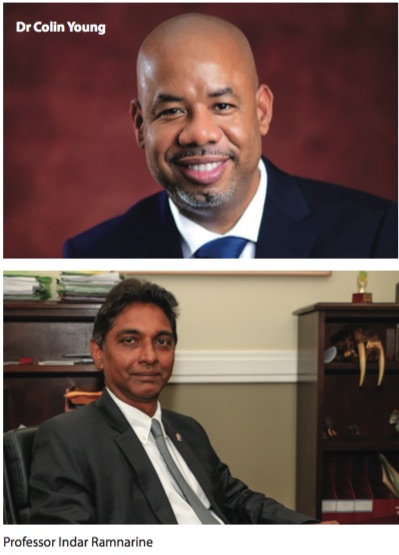Climate change is recognised as an “existential threat to our way of life”, said Dr Colin Young, Executive Director of the Caribbean Community Climate Change Centre (CCCCC). Yet that knowledge hasn’t penetrated the society enough to lead to the kind of urgent action necessary to pull us back from the brink. More is needed.
As part of a four-year European Union-funded project, Dr Young and several other climate and environmental issues experts from around the world, took part in a capacity building and training programme for Caribbean governments. The programme, held virtually, was hosted from December 6 to 8 by UWI St Augustine.
“We need to do much more to improve our understanding of and our ability to make better decisions in the face of climate change,” Dr Young told the attendees, primarily experts from several regional governments, on Day 1 of the programme.

The training was part four of the Enhancing Climate Resilience in CARIFORUM Countries project that was launched in 2019 by CCCCC in partnership with the Intra-African, Caribbean and Pacific Group (ACP) GCCA+ Programme. The project, a statement from CCCCC said, “aims to strengthen the climate risk management framework in the 16 CARIFORUM member countries”.
The Caribbean Forum is a subgroup of the Organisation of African, Caribbean and Pacific States and serves as a base for economic dialogue with the European Union. It is made up of the 15 CARICOM countries and the Dominican Republic.
The three-day training programme, hosted through the St Augustine Campus’ Centre for Excellence in Teaching and Learning (CETL), gave participants information on topics like climate variability, climate change and disaster risk management, the blue economy, food security, and awareness campaigns and messaging.
Speaking on the importance of addressing climate change and the dire consequences faced by the Caribbean, Professor Indar Ramnarine, Deputy Principal of UWI St Augustine, said, “in this region and across the globe, we have been facing the increasingly severe effects of climate change. Our vulnerability, especially that of our low-lying island states, is one of grave concern.”
The Deputy Principal said that UWI “fully supported the idea of this workshop”, and that “the importance and urgency of climate change has long been a priority of The UWI”. He added that the university was glad for the opportunity to work in partnerships such as the training programme to “increase knowledge, improve attitudes and positively influence practices within the region”.
Among the presenters were Professor John Agard, Executive Director of The UWI’s Global Institute for Climate Smart and Resilient Development (GICSRD), who spoke on “mainstreaming environmental considerations into the core of policy and decision-making”.
The UWI launched the GICSRD in October 2021, to increase the scientific understanding of the changing climate and its impact on communities and economies. The university also recently hosted a virtual gathering of around 25 regional and international organisations to discuss the public health challenges of climate change. The research presented highlighted links between climate change and the non-communicable disease epidemic in the Caribbean.
Mr Bogdan Stefanescu, team leader for Green Economy, Energy and Resilience in the EU Delegation to Barbados, spoke forcefully at the opening ceremony. Quoting from a climate change report, he said that thoughtless little actions add up.
“A disappearing species, a plastic straw thrown on the beach, a bulb left on when not needed, all this will affect us slowly in the long run like our own handmade slow onset disaster,” stated Mr Stefanescu.
The Enhancing Climate Resilience training programme is a joint effort of the CCCCC, The UWI, the Intra-ACP GCCA+ Programme, AESA (an international development consulting firm) and OIKO (a provider of technical advice and analysis for sustainable development around the world). CCCCC is the body that coordinates the Caribbean response to climate change. It is the knowledge centre for regional climate change information and provides policy advice to the CARICOM member states.
First announced in September 2019 at a ceremony in Bridgetown, Barbados, the 12 million-euro Enhancing Climate Resilience project is being funded by the EU Commission. “The project will,” CCCCC stated, “assist member countries to enhance climate observational and monitoring networks, improve and climate-proof water infrastructures while building the capacity of governments and private sector to integrate risk management techniques into development and planning.”
It will also, “support the expansion of educational and outreach programmes”.
For more information on CCCCC and the Caribbean response to climate change, visit https://www.caribbeanclimate.bz/.